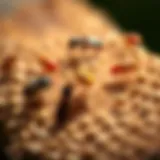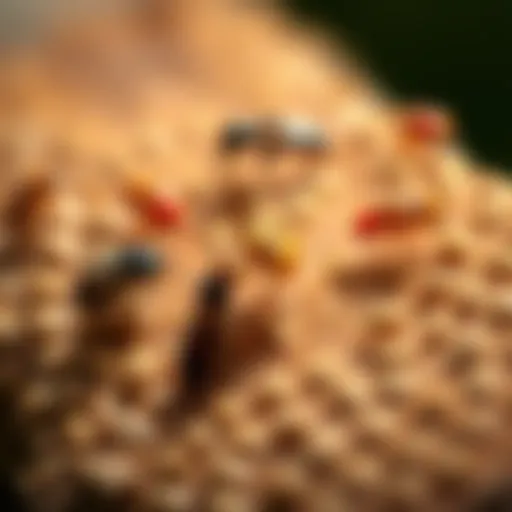Understanding Exterminators in Plymouth: A Comprehensive Guide
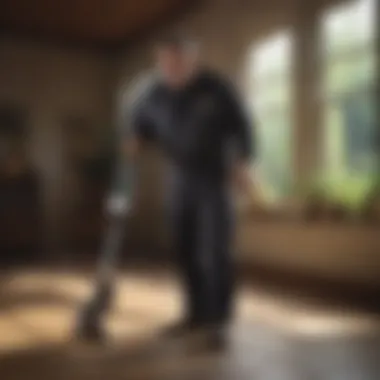

Intro
Exterminators play a vital role in maintaining a harmonious living environment in Plymouth, particularly when it comes to identifying and managing pest issues. Their expertise not only helps in eliminating unwanted pests but also contributes significantly to preserving the integrity of homes and promoting overall public health. This guide outlines the importance of exterminators, the pests commonly encountered in this region, and the methodologies employed for their control and prevention.
Pest Identification
Understanding the types of pests that may invade your home is crucial for effective pest control. Proper identification can lead to timely intervention, reducing the potential damage caused by these infestations.
Common Household Pests
Pests vary widely in type, and the most common household offenders in Plymouth include:
- Ants: Often found in kitchens or near food sources.
- Rodents: Such as mice and rats, that can pose health risks and cause property damage.
- Cockroaches: Known for their resilience and breeding capabilities.
- Termites: Infamous for silently destroying wood structures.
- Bed Bugs: Easily transported and challenging to eradicate.
Each of these pests requires specific methods for effective control.
Signs of Infestation
Recognizing the signs of an infestation is essential. Look for:
- Droppings or food remnants, indicative of rodent or insect activity.
- Damaged wood or hollow-sounding structures for potential termite issues.
- Unexplained stains or spots, often signs of bed bugs.
- Trails or lines, which ants may leave as they navigate towards their food sources.
Awareness of these signs enables homeowners to take immediate action.
Prevention Methods
Preventing pest infestations is the first line of defense. It involves making simple lifestyle changes and modifications to the home environment.
Environmental Modifications
Adjusting the environment can deter pests effectively. Consider:
- Regular lawn maintenance to reduce habitats for insects and rodents.
- Eliminating standing water to prevent mosquito breeding.
- Sealing cracks and crevices in structures to limit entry points for pests.
Home Maintenance Tips
Regular maintenance checks can significantly reduce the likelihood of an infestation. This includes:
- Keeping food stored in sealed containers.
- Maintaining cleanliness in kitchens and dining areas.
- Repairing leaky pipes to thwart water-loving pests.
Implementing these tips fosters a pest-free environment.
DIY Pest Control Solutions
Beyond professional extermination, homeowners can consider several DIY methods to manage pest problems effectively.
Natural Remedies
Various natural solutions may help in curbing pest infestations:
- Vinegar: Acts as a deterrent for ants when used as a cleaning solution.
- Essential oils: Such as peppermint and tea tree oil can repel numerous insects.
- Diatomaceous earth: Effective against crawling insects when sprinkled in areas of high activity.
DIY Traps and Barriers
Creating traps can offer immediate relief:
- Homemade mouse traps using simple household items.
- Soap and water traps for flying insects.
- Physical barriers such as mesh screens can prevent entry.
As part of an overall pest management plan, these solutions contribute to a more sustainable approach to pest control.
The importance of timely pest identification and control cannot be overstated; proactive measures can save both time and resources in the long run.
Preamble to Pest Control
Pest control is an essential practice in maintaining a healthy and safe living environment. It involves the management and regulation of unwanted organisms, commonly referred to as pests. These can include insects, rodents, and various other wildlife that may invade our homes or properties. Understanding pest control is crucial for homeowners, as it directly impacts their health, comfort, and property value.
In Plymouth, where diverse urban environments exist, the potential for pest infestations is a persistent challenge. The importance of pest control lies not only in the eradication of these nuisances but also in the prevention of future infestations. A proactive approach is vital for protecting homes and ensuring that pest populations do not become a severe issue.
Benefits of Pest Control
Effective pest control offers various benefits:
- Health Protection: Pests such as rodents and insects can transmit diseases, posing health risks to residents. Eliminating these pests helps safeguard families and pets.
- Protection of Property: Termites, for instance, can cause significant structural damage. Timely intervention can save homeowners from costly repairs.
- Peace of Mind: Knowing that a professional pest control service is handling infestations allows homeowners to relax without the constant worry of pests.
- Sustainability: Modern pest control methods emphasize eco-friendly solutions. Using these strategies minimizes the impact on the environment while effectively managing pest populations.
Considerations in Pest Control
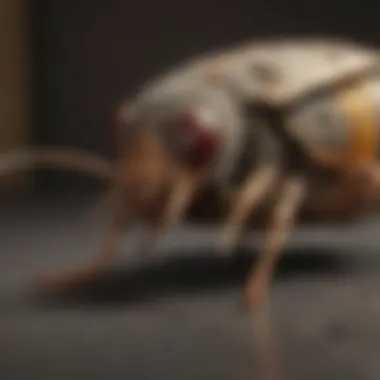

When contemplating pest control, several considerations must be taken into account:
- Identifying the Pest: Understanding what type of pest is present is the first step in the control process. Each species may require a different approach.
- Selecting the Right Methods: Different pest control methods, such as chemical treatments or integrated pest management, best suit specific scenarios. Thorough evaluation helps determine the most effective strategy.
- Long-Term Solutions: Beyond immediate extermination, it is crucial to implement strategies that prevent future infestations. This might include sealing entry points, maintaining cleanliness, and ongoing monitoring.
"A systematic approach to pest control not only addresses current infestations but also circumvents future problems, contributing to a more harmonious living space."
Understanding the nuances of pest control provides homeowners with the knowledge they need to make informed decisions. This foundation sets the stage for delving deeper into the roles and responsibilities of exterminators, the common pests found in Plymouth, and the variety of methods employed to handle these challenges.
The Role of an Exterminator
The role of an exterminator encompasses a significant aspect of pest management that often goes unnoticed until problems arise. Exterminators are professionals trained in dealing with a variety of pests, employing an array of methodologies tailored to effectively identify and eliminate infestations. Their services are an invaluable asset to households and commercial establishments alike, particularly in regions like Plymouth, where the risk of pest occurrence can fluctuate based on numerous factors.
Definition and Responsibilities
An exterminator, at its core, is a technician who specializes in the removal and prevention of pest infestations. Their responsibilities include:
- Inspection: Exterminators begin with a thorough evaluation of the premises. This assessment identifies not only the type of pest present but also the extent of the infestation.
- Treatment Plan: Based on the findings from the inspection, exterminators develop a tailored treatment plan. This could involve chemical treatments, traps, or other pest control methods.
- Implementation: The exterminator executes the treatment plan. This often includes applying pesticides or setting traps in strategic locations to maximize effectiveness.
- Follow-Up: Regular follow-ups are essential for ensuring the treatment’s success. Exterminators often return to check for signs of reinfestation.
In summary, the scope of an exterminator’s work is multifaceted, requiring knowledge, skill, and attention to detail. Their expertise not only alleviates immediate issues but also sets the groundwork for long-term pest management strategies.
Importance in Urban Environments
Urban environments, much like Plymouth, present unique challenges concerning pest control. The density of buildings and the proximity of residences create suitable breeding grounds for various species of pests both common and invasive.
In these areas, the importance of exterminators intensifies for several reasons:
- Preventive Action: Without professional pest control, small infestations can quickly escalate into larger problems. Exterminators help in identifying and addressing issues before they spiral out of control.
- Health Risks: Many pests pose serious health risks. Rodents and insects can carry diseases that are harmful to humans. Exterminators mitigate these dangers by ensuring proper treatments are applied swiftly.
- Property Protection: Certain pests, such as termites, have the potential to cause significant structural damage to homes. Exterminators play a critical role in protecting properties from such threats, safeguarding homeowner investment.
- Sustainable Practices: Many exterminators utilize integrated pest management techniques, which underscore eco-friendly practices. This approach not only addresses immediate concerns but also considers the long-term health of the environment.
Pest Problems in Plymouth
Pest problems in Plymouth are of considerable significance and demand attention from homeowners and pest control professionals alike. Understanding these challenges forms the foundation of effective pest management strategies. It is crucial because recognizing common pest species and their behaviors can help in preventing infestations before they escalate. By being informed, homeowners can protect their properties from damage and health risks associated with pests. Furthermore, insights into seasonal trends allow for better preparedness throughout the year.
Common Pest Species
Rodents
Rodents like mice and rats are frequent visitors in many Plymouth homes. They often seek shelter indoors during colder months, which can lead to significant issues if left unaddressed. Mice reproduce rapidly, which means that a small problem can quickly escalate into an infestation. One key characteristic of rodents is their ability to fit through small openings. For instance, a mouse can enter through a hole the size of a dime.
Rodents contribute to the overall topic of pest control in Plymouth as they can cause property damage and pose health risks. They might chew through wires, insulation, and even cabinetry. Their droppings can carry diseases that affect humans and pets, making their control paramount. The advantage of understanding rodent behavior is that it equips homeowners with the knowledge to implement preventive measures effectively.
Insects
Various types of insects also pose problems in Plymouth. Common examples include ants, cockroaches, and bed bugs. These pests can invade homes, leading to extensive issues if not addressed promptly. One of the notable characteristics of insects is their ability to adapt to various environments. For instance, cockroaches can survive in extreme conditions, making them particularly resilient.
Insects are a concern because they often reproduce in rapid succession. An ant colony can grow exponentially in a short time frame, resulting in a significant infestation. The unique feature of insects is their social behavior, particularly in species like ants and bees, which can complicate control measures. This can hinder efforts to eradicate them once they have established a presence.
Termites
Termites are among the most destructive pests that homeowners face. They consume wood and can weaken the structural integrity of a home without immediate detection. A distinctive aspect of termites is their tendency to work quietly, often going unnoticed until substantial damage has occurred. This characteristic makes early detection critical to avoiding costly repairs.
The contribution of termites to pest problems is significant due to their damaging potential. Techniques for termite control are essential knowledge for homeowners in Plymouth. One advantage of understanding termite behavior is the ability to recognize signs of infestation early, such as mud tubes or discarded wings. This knowledge enables proactive measures to safeguard properties.
Seasonal Pest Trends
Seasonal trends in pest activity in Plymouth present an important consideration for homeowners. Different pests emerge during specific times of the year, influenced by weather changes and environmental conditions. For example, warmer months may bring an increase in insect populations, such as ants and mosquitoes, while colder months may lead rodents to seek shelter indoors.
Homeowners should be aware of these trends to establish effective pest management practices. Understanding which pests are prevalent in each season allows for targeted actions. For instance, sealing entry points in the fall may prevent rodents from entering during winter. Similarly, applying insect treatments before the summer can reduce infestations when insects are on the rise.
Monitoring these seasonal patterns not only prepares homeowners for potential pest issues but also informs the timing of extermination efforts. Effective pest control relies heavily on the ability to adapt strategies based on changing seasons and pest behavior.
Extermination Methods
Extermination methods play a crucial role in effective pest control. Understanding the different approaches available can help homeowners in Plymouth make informed decisions when dealing with infestations. The right extermination strategy not only eliminates the current pest issue but also reduces the likelihood of future problems. It's essential to consider various methods carefully to choose the most appropriate one for a specific situation. Let's explore three key methods known for their efficacy: chemical treatments, biological control measures, and integrated pest management.
Chemical Treatments
Chemical treatments involve the application of pesticides to eliminate pests. These methods are commonly used because they often provide immediate results. Chemicals can be in the form of sprays, powders, or baits, targeting various pest species effectively. However, it is important to use them wisely due to potential health risks for humans and pets. Homeowners should prioritize safety by following instructions closely during any treatment process.
Benefits of chemical treatments include:
- Fast Acting: Many pesticides kill pests shortly after contact.
- Targeted Solutions: Pesticides can be formulated to combat specific pests.
- Accessibility: Products are widely available in stores and online.
Considerations include:
- Health Risks: Possible exposure to harmful chemicals necessitates proper safety measures.
- Environmental Impact: Some chemical solutions can adversely affect local wildlife and ecosystems.
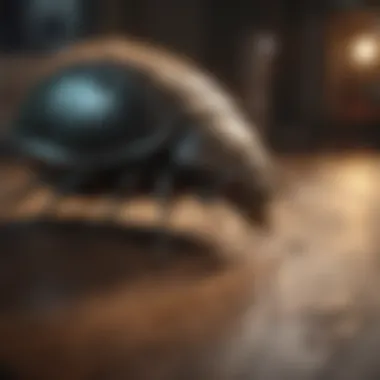

Biological Control Measures
Biological control measures focus on using natural predators to manage pest populations. These methods are becoming increasingly popular due to their eco-friendly nature. For instance, introducing ladybugs can help control aphid infestations effectively. Also, nematodes can target soil-dwelling pests. Biological methods are sustainable and minimize environmental damage, making them preferable for many homeowners.
Benefits of biological control measures include:
- Sustainability: They promote long-term pest management without harsh chemicals.
- Minimal Environmental Damage: These solutions have a significantly lower impact on non-target creatures and ecosystems.
However, it is important to acknowledge that:
- Time Required: Biological measures may take longer to see results compared to chemical treatments.
- Complexity: Understanding the ecosystem is vital to implement these measures effectively.
Integrated Pest Management
Integrated Pest Management (IPM) is a comprehensive strategy combining different pest control methods. This approach emphasizes environmentally sustainable and cost-effective practices. IPM often includes monitoring pests, identifying threats, and applying a combination of chemical, biological, and cultural methods to manage infestations.
Benefits of IPM include:
- Holistic Approach: Provides a full view of the pest ecosystem.
- Long-Term Solutions: By addressing the root causes of infestations, IPM helps prevent future problems.
- Cost-Effective: May reduce the amount of pesticide needed, thus saving homeowners money.
Challenges may consist of:
- Knowledge Required: Homeowners should stay informed about pest behavior and treatment options.
- Time Investment: IPM may require more time for monitoring and assessment compared to single-treatment approaches.
Integrated Pest Management allows homeowners to approach pest control with skill and foresight, reducing the chance of recurring issues.
By understanding these extermination methods, residents can make better choices regarding pest control. Each method has its strengths and weaknesses, and finding the right balance is key to effective pest management in Plymouth.
Choosing the Right Exterminator
Selecting an exterminator is an essential process for any homeowner facing pest issues. Making an informed choice can significantly impact the effectiveness of pest control services. An experienced exterminator brings knowledge about local pest challenges, as well as the right tools and techniques to address them effectively. Moreover, proper selection can help avoid future infestations and promote a healthier home environment. It is crucial to consider several factors to ensure you choose a professional who aligns with your needs.
Certifications and Licenses
Certifications and licenses signify that an exterminator possesses the required training and experience to handle pest control. In many regions, exterminators must comply with local regulations and obtain specific licenses before operating. This ensures they are trained to use pest control methods safely and effectively. Homeowners should verify that the exterminator has the necessary credentials.
A few key points regarding certifications and licenses include:
- State Requirements: Each state has unique regulations. Homeowners should confirm that the exterminator is certified in the state of Plymouth.
- Training Programs: Different certifications indicate diverse levels of training. Highly regarded certifications, such as those from the National Pest Management Association, may suggest advanced expertise.
- Continuing Education: The pest control industry is constantly evolving due to new pest behaviors, treatments, and technologies. An exterminator who participates in ongoing education demonstrates commitment to staying current in the field.
By prioritizing licensed professionals, homeowners can significantly enhance their chances of successful pest management.
Reviews and Recommendations
When looking for the right exterminator, reviews and recommendations from previous clients can provide invaluable insights. Positive feedback can indicate effective pest control services and customer satisfaction. Homeowners should consider gathering information from multiple sources to gauge an exterminator’s reputation.
- Online Reviews: Websites like Yelp or Angie's List allow clients to leave reviews. Reading both positive and negative reviews can give a balanced view of the exterminator's performance.
- Word-of-Mouth: Personal recommendations from friends, family, or neighbors can carry weight. These sources may provide honest assessments based on direct experiences.
- Professional Associations: Exterminators who are members of professional organizations tend to be committed to industry standards. Membership often indicates reliability and quality.
As you explore exterminators, keep in mind that a solid reputation can lead to effective pest management, ensuring a peaceful home for you and your family.
Always seek out an exterminator with demonstrated success and credible industry standing to avoid common pitfalls associated with pest control.
Preparing for an Extermination Service
Preparing your home for an extermination service is a crucial task that can significantly affect the effectiveness of the pest control treatment. Understanding what to do before the exterminators arrive not only helps them do their job more efficiently but also minimizes the risk of accidents, ensuring safety for everyone involved.
Homeowner Responsibilities
Homeowners play an essential role in the preparation process. Being proactive can lead to a smoother service and greater satisfaction with the results. Below are some key responsibilities:
- Clear the Area: Exterminators require ample space to work effectively. Clear any furniture, toys, or other items away from treatment areas. This helps the technician access affected areas, enhancing coverage and eliminating hiding spots for pests.
- Notify About Pets: Inform the exterminator about any pets you have. Pets may need to be relocated temporarily to a safe environment during the treatment process. This ensures their safety and prevents them from interfering with the extermination methods.
- Clean Your Home: While cleaning may seem counterintuitive before pest control, it can actually help the exterminators identify pest issues better. A clean environment allows for a more thorough inspection and can aid in spotting pest entry points.
- Discuss Prior Treatments: If you have previously attempted pest control measures, share that information. This includes mentioning any pesticides used or methods previously applied. This knowledge helps the exterminator devise a more effective treatment plan.
"Effective communication with your exterminator is vital. It lays the groundwork for successful pest management."
Safety Precautions
Safety is paramount when preparing for pest control services. Taking specific precautions can protect your family, pets, and home during the treatment process.
- Inform the Exterminators: Always communicate if anyone in your household has allergies or respiratory issues. Knowing this information allows the exterminator to choose treatments that minimize these health risks.
- Seal Food and Utensils: For treatments that may involve chemical applications, seal all food items. Store kitchen utensils in cabinets or drawers to avoid contamination. This is important for maintaining safety standards in your home.
- Ventilate Your Home: Good airflow is necessary after treatment. Open windows and doors if possible to allow fresh air to circulate. This not only helps dispel any lingering odors but also enhances air quality.
- Children and Pets: Keep children and pets away from treated areas for the recommended duration after the exterminator leaves. Ensure they are in a separate, safe space where they won’t wander back until it is safe.
By understanding and fulfilling these responsibilities, homeowners not only facilitate a more efficient pest treatment process but also ensure enhanced safety for their families and pets. This preparation phase lays a solid foundation for effective pest management, resulting in long-term pest control outcomes.
Post-Extermination Measures
Post-extermination measures are a crucial element in maintaining a pest-free environment. After an infestation has been addressed, the work is not over. This phase focuses on monitoring and taking preventive actions to avoid future infestations. Homeowners must understand that pests can be resilient, and without proper follow-up action, the issue can recur, often more severely than before.
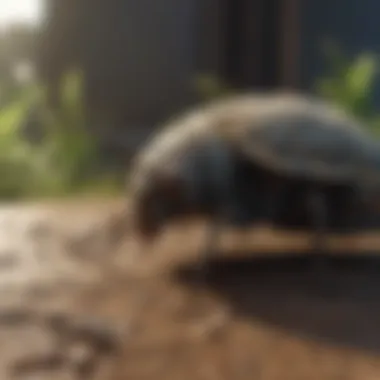

Monitoring for Reinfestation
Monitoring for reinfestation is essential after an extermination process. This is not only about observing for signs of pests but also involves being proactive in identifying the conditions that could lead to another infestation. Homeowners should keep an eye out for the following:
- Signs of Pest Activity: Look for droppings, gnaw marks, or actual insects. These could indicate the return of pests.
- Entry Points: Inspect the home for new gaps or holes. Rodents can squeeze through surprisingly small spaces.
- Moisture Issues: Pests like termites thrive in moist environments. Fix any leaks promptly.
Regularly checking for these indicators can help in taking timely action if pests return. Setting up simple traps can also be an effective monitoring strategy. Keep in mind that early detection is key to managing potential problems before they develop into full-blown infestations.
Preventive Strategies
Preventive strategies are vital for long-term pest control. Implementing these measures helps ensure that homes remain less attractive to pests. Here are some steps homeowners can take:
- Seal Cracks and Openings: Thoroughly inspect your home for any cracks in walls or openings around windows and doors. Use caulk or other appropriate materials to seal these entry points.
- Maintain Cleanliness: Keeping clutter to a minimum is important. Regular cleaning, particularly in kitchens and dining areas, reduces food sources that attract pests.
- Landscaping Considerations: Maintain the yard properly. Overgrown vegetation can harbor pests. Ensure that mulch is not too close to the foundation, as it can provide a nesting area.
- Regular Inspections: Schedule routine inspections with pest control professionals to keep an eye on potential issues. They can provide tailored advice based on specific pest threats in the Plymouth area.
"An ounce of prevention is worth a pound of cure." - Benjamin Franklin
By integrating consistent monitoring and preventive measures into a homeowner's routine, the likelihood of reinfestation greatly decreases. These practices contribute to a sustainable pest management program that protects the home and enhances the living environment.
Environmental Considerations in Pest Control
Understanding the environmental aspects of pest control is essential, especially in a world that increasingly values sustainability. The methods used by exterminators not only affect the immediate area but also have long-term consequences on local ecosystems. This section will delve into eco-friendly pest solutions and examine the potential impacts on local wildlife and habitats. Making informed choices in pest control can lead to healthier, more sustainable environments for both humans and wildlife.
Eco-Friendly Pest Solutions
Eco-friendly pest solutions are becoming significant in Plymouth's pest control landscape. Homeowners increasingly seek methods that minimize harm to the environment. Traditional chemical treatments often raise concerns about toxicity. In contrast, eco-friendly options include natural insect repellents and biological controls.
Some effective natural pest control methods you might consider include:
- Essential Oils: Oils like peppermint and lavender can deter a variety of pests.
- Diatomaceous Earth: A non-toxic powder that damages pests' exoskeletons on contact.
- Insecticidal Soaps: Made from natural ingredients, they can effectively control soft-bodied insects without harming beneficial species.
Using these solutions helps to reduce chemical residues in the home and surrounding area. These methods not only target specific pests but also promote a safer living environment for children and pets. Choosing eco-friendly options reflects a commitment to sustainability.
Impact on Local Ecosystems
The impact of pest control methods on local ecosystems is a topic of growing concern. Pest exterminators often utilize chemicals that can persist in the environment. Alongside the benefits of pest control, there are considerations about the unintended consequences on wildlife.
Here are some critical points to contemplate regarding the ecosystems in Plymouth:
- Biodiversity Loss: Excessive use of chemicals can lead to a decline in non-target species, affecting biodiversity and disrupting food chains.
- Water Contamination: Runoff from treated areas can contaminate local water bodies, harming aquatic life and, potentially, human health.
- Pollinator Health: Many common pest treatments are harmful to essential pollinators like bees. Protecting these species is crucial for maintaining plant diversity.
"The health of local ecosystems is intrinsically linked to the methods we choose for pest control. Each action can ripple through the environment."
To mitigate adverse effects, exterminators can adopt Integrated Pest Management strategies. These strategies prioritize prevention and use chemical treatments only when necessary, aiming to minimize harm to the environment. By understanding these elements, homeowners can make better decisions that align pest control practices with ecological health.
Legal Regulations on Pest Control
Understanding legal regulations concerning pest control is vital for homeowners in Plymouth. These regulations not only protect the environment but also ensure the safety of residents and their properties. Complying with the legal framework surrounding pest control minimizes risks associated with pest treatments, which can sometimes involve hazardous chemicals. In an era where sustainability and health considerations are more significant than ever, keen awareness of these laws is an asset for any homeowner contemplating pest management solutions.
State Laws and Guidelines
In Plymouth, pest control is governed by various state laws and guidelines that dictate how extermination services should operate. These regulations cover a broad spectrum, from licensing requirements for pest control professionals to specific protocols for the use of pesticides.
Key points regarding state laws include:
- Licensing Requirements: Exterminators must hold licenses, which often require passing examinations that ensure they understand pest biology and safe application techniques. This helps in preventing misuse of pesticides that might harm non-target organisms.
- Pesticide Regulations: The state has strict guidelines about which chemicals can be used and the ways they can be applied. Some substances might be banned due to their harmful environmental impact.
- Notification Obligations: Pest control companies are often required to inform homeowners of the chemicals being used on their properties. This transparency is key for understanding health risks and safety precautions.
Compliance and Best Practices
Compliance with pest control regulations is not merely about avoiding penalties. It serves as a foundational principle for achieving effective pest management. Exterminators who adhere to these best practices establish trust with their clients and promote community well-being.
Important compliance strategies include:
- Regular Training: Pest control professionals should undergo consistent training to stay abreast of new regulations. This guarantees that they utilize the most current techniques and products effectively and safely.
- Documentation: Keeping thorough records of pesticide applications and the pest management process is crucial. This not only complies with legal requirements but also allows for effective monitoring of pest issues over time.
- Sustainability Practices: Adopting integrated pest management strategies that prioritize eco-friendly options often aligns with regulatory trends toward environmentally sensitive practices.
Quote: "The right balance between effective pest control and regulatory compliance can enhance the long-term health of your home and its surroundings."
In summary, understanding legal regulations on pest control enhances safety, promotes responsible management, and contributes to sustainable practices that benefit both homeowners and the wider community.
Epilogue
The conclusion of this article is essential as it encapsulates the key aspects discussed throughout the text. Understanding the significance of professional exterminators in Plymouth is crucial for homeowners and housewives. Effective pest control strategies are necessary not only for maintaining a healthy living environment but also for protecting property values. Pest infestations can lead to extensive damage over time, potentially costing homeowners significant amounts in repairs.
In summarizing the information, it becomes clear that hiring a certified exterminator is beneficial. These professionals bring expertise and knowledge that can effectively tackle various pest issues. They utilize advanced methods ranging from chemical treatments to biological control measures. This ensures a thorough approach to pest management, reducing the likelihood of reinfestation.
Homeowners should also be aware of the environmental considerations involved in pest control. Eco-friendly solutions are becoming increasingly popular, and understanding these options gives residents a proactive approach to managing pests without harming local ecosystems.
"The right exterminator can provide tailored solutions for various pest problems, protect your home, and offer peace of mind."
The importance of compliance with legal regulations cannot be overlooked. Understanding state laws and guidelines ensures that pest management practices uphold safety for both residents and the environment. Additionally, knowledge of best practices helps in making informed decisions regarding pest control services.
Finally, a well-prepared homeowner who understands their responsibilities can significantly enhance the effectiveness of extermination services. After all, pest prevention is a collaborative effort. By synthesizing all this information, readers are equipped with the necessary insights to approach pest control intelligently and effectively.










